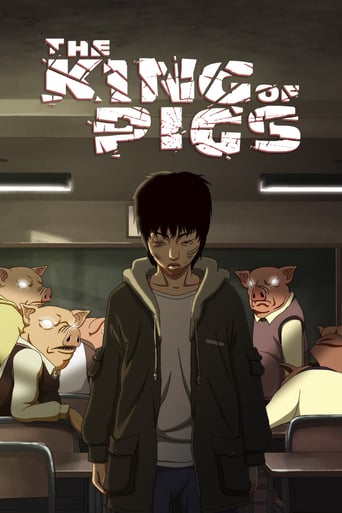tieman64
"Americans remind me of survivors of domestic abuse. There is always the hope that this is the very, very, very last time one gets one's ribs re-broken." - Inga Muscio Grotesque and violent, Yeun Sang-Ho's "The King of Pigs" is a low budget animated feature from South Korea. Like a demented take on Orwell's "Animal Farm", or Golding's "Lord of the Flies" (to which its title alludes), the film watches as a gang of privileged kids (nicknamed the "dogs") repeatedly brutalise and bully a school's lower class students (nicknamed the "pigs").Orwell's tale saw one pig rise and destroy his oppressors. In "The King of Pigs" we see a poverty stricken student, Chul Kim, stand up to his bullying school-mates. Rather than a romantic hero, though, Chul is portrayed as a violent psychopath. "We must become more evil than they are," Chul explains, internalising the hate directed at him and re-directing it, tenfold, at those who brutalise him.Virtually everyone in Yeun Sang-Ho's tale is understood as being either a victim or victimiser. Workers and employers, the rich and the poor, businessmen and prostitutes, students and teachers, men and women, bullies and classmates, humans and animals...they're all trapped in Yeun Sang-Ho's very rigid social hierarchy. Even those who seem to escape poverty ultimately find themselves back in financial debt, beholden to others. Capitalism as a form of psychic and literal violence, the film paints a world bound by the laws of competition, predation and psychopathy. "Money only follows the rich," Chul says, "you need to be a monster if you don't want to keep living like a loser." Whilst Yeun Sang-Ho's film portrays a very real, contemporary problem in South Korea – parental/social pressures and limited job vacancies have led to a rise in local bullying – all his films are works of social critique which portray a more global situation. In "Pigs" we thus see an expansive, social hierarchy based on wealth; the ruling "dogs" and the subservient "pigs". This regime, which infects all social institutions, is enforced by the oldest all the way down to the youngest. Through them, violence is perpetrated against those lower in the social pecking order: the rich against the poor, men against women and humans against animals, who represent the lowest rung on the ladder and the most vulnerable."The King of Pigs" is blunt, unsubtle and pushes its ideas, themes and caricatures to every possible extreme. Women aren't only abused by husbands, but decapitated. Children aren't cruel to animals, but stab them repeatedly. Bosses don't underpay their employees, but beat and humiliate them in public. Like all good grotesque art, Yeun Sang-Ho deals entirely in extremes. Interestingly, the film's aesthetic limitations (low frame rate, small budget etc) only amplify its more grotesque aspects. The result is not only a film populated with freakish, disturbing characters, but one which taps deeply into a reality shared and suffered by many in our world. Elsewhere the film touches upon domestic violence, portraying it as a consequence of male disenfranchisement and male impotency (numerous studies have pointed to the correlation between male unemployment and violence toward women and children).Like an animated version of Pasolini's "Salo", every scene in Yeun Sang-Ho's film is drenched in overt brutality or quiet, unsettling angst. The film's nihilism, which only occasionally gives way to compassion, reaches its apex with Yeun Sang-Ho's final scene. Here the film pushes past the moral bankruptcy of late-capitalism to declare our entire species valueless. "Earth is covered by asphalt as cold as ice and by bodies colder that it is," a young killer muses. Yeun Sang-Ho's follow-up film, "The Fake", is equally misanthropic.8.9/10 – Superb.
kosmasp
The movie tries to get in a really tough subject matter. While doing so, it does steer away too much though. The constant flashbacks (Rashomon this ain't) and the pace do not work in favor of the movie. The subject is very serious indeed (bullying) and is not to be taken lightly (no matter what country it happens and it unfortunately happens a lot), but while the movie does not take it lightly, it does try too hard. The moral finger pointing is heavy ... too heavy.The anime style is good throughout, but the movie still felt like it had double the running time. One other thing that made it penetrating and almost unbearable were the subtitles. The filmmaker is (likely) not responsible for those, but it does add to the overall dissatisfaction you might feel while watching this. A feeling that arises because you might feel that this subject matter could've been handled better.
Mozjoukine
Serious animation is no longer a novelty but the bleakness of this Korean toon is disturbing.Leaving a girl with a rope mark on her neck, the bespectacled lead 'phones the old school pal, who is having domestic troubles of his own. During their night drinking and walking together, we see flashbacks to their school days, where they were at the bottom layer of a brutal system of bullying.The director's first feature is done with limited movement and only occasional flashes of striking imagery - the animal headed class mates, the ugly ghost cat, simulated afternoon light. Using female voices for the boys is also alienating. The film is so intense that viewers are likely to forget the exposition and find themselves unsatisfied by the rapid wind-up.Think of this as a curious companion to the similarly themed OLD BOY and part of the country's ultra-violence cycle, among which it is a stand out.




